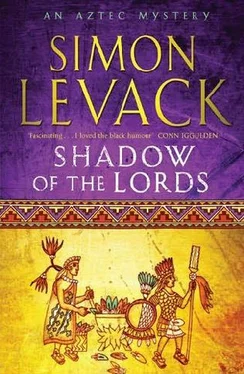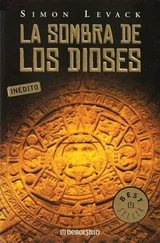Simon Levack - Shadow of the Lords
Здесь есть возможность читать онлайн «Simon Levack - Shadow of the Lords» весь текст электронной книги совершенно бесплатно (целиком полную версию без сокращений). В некоторых случаях можно слушать аудио, скачать через торрент в формате fb2 и присутствует краткое содержание. Год выпуска: 2011, Издательство: St. Martin, Жанр: Исторический детектив, на английском языке. Описание произведения, (предисловие) а так же отзывы посетителей доступны на портале библиотеки ЛибКат.
- Название:Shadow of the Lords
- Автор:
- Издательство:St. Martin
- Жанр:
- Год:2011
- ISBN:нет данных
- Рейтинг книги:4 / 5. Голосов: 1
-
Избранное:Добавить в избранное
- Отзывы:
-
Ваша оценка:
- 80
- 1
- 2
- 3
- 4
- 5
Shadow of the Lords: краткое содержание, описание и аннотация
Предлагаем к чтению аннотацию, описание, краткое содержание или предисловие (зависит от того, что написал сам автор книги «Shadow of the Lords»). Если вы не нашли необходимую информацию о книге — напишите в комментариях, мы постараемся отыскать её.
Shadow of the Lords — читать онлайн бесплатно полную книгу (весь текст) целиком
Ниже представлен текст книги, разбитый по страницам. Система сохранения места последней прочитанной страницы, позволяет с удобством читать онлайн бесплатно книгу «Shadow of the Lords», без необходимости каждый раз заново искать на чём Вы остановились. Поставьте закладку, и сможете в любой момент перейти на страницу, на которой закончили чтение.
Интервал:
Закладка:
‘Reporting what?’
‘The theft of the bloody costume!’
In the silence that followed, my exasperated cry seemed to bounce back at me off the walls of the courtyard.
Skinny and his wife both stared at me, their expressions as cold and unmoving as those of the idols on the walls around us. I began to wonder whether I might be wrong, and whether it was possible that the featherworker had not stolen the costume from Kindly after all.
It was the woman who spoke.
‘I really think you ought to leave now, Joker.’ She hissed the words at me between clenched teeth, but followed them with a deep sigh and a reminder of her smile. ‘I’m sorry, but you’ve made a mistake. Things are hard for us. You must understand.’
Skinny scowled at me. I scowled back, but plainly pulling faces was not going to do me any good.
I got to my feet. ‘You know where to come if you change your mind!’
I spoke to the man, but I let my eyes linger for a moment on the woman. I did not care if it seemed ill mannered. I had had enough of playing games with the two of them, and besides, she was beautiful, and I did not expect to see her like again soon.
2
My son’s knife jarred against my hip as I walked back towards Amantlan. Each time the hard smooth metal knocked against my skin it reminded me of him. Each jolt was like a faint cry, a distant sound of despair and pain and fear which I could never answer, and each imagined cry seemed fainter and more plaintive than the last.
I felt an impulse to take the knife out and look at it, to talk to it even, as if it were the only thing I had left of its owner. I fumbled inside my breechcloth for it but came to my senses just in time. There were too many people about, any of whom might have noticed a thin, ragged slave clutching a unique bronze knife. Boatmen poled their canoes nonchalantly through canals that, here at least, were regularly cleaned and dredged by work details made up of the parish’s common folk. Little children, their cloaks flapping over their naked loins, followed their mothers from house to house, the women bearing food or hot coals to light a failed hearth or just going to gossip. A small group of men was working its way along the canal towards me, their calf-length cloaks, stone-pillar hairstyles, cudgels and set, determined expressions giving them the look of a war party.
I peered at the soldiers, looking nervously among them for a green uniform or the peculiar glitter of sunlight on the blades of the captain’s vicious club. I tensed, with my fingers curledtightly around the hilt of the knife. If the Otomies had managed to extricate themselves from the chaos I had left behind me in Tlacopan, they might well be after me, to punish me for misleading them.
These were not the captain’s warriors, however. From the casual way they spoke to passers-by, they seemed to be locals, and it was easy enough to guess what they were about. Somebody must long since have gone behind that screen by the canal and found the remains among the stinking pots there, and these men were making routine enquiries.
I let go of the knife, pulling my hand out of my breechcloth just as a young woman, a passenger in a canoe, shot me a disgusted look.
I lowered my eyes self-consciously before turning quickly away.
I dared not go back across the bridge between Amantlan and Pochtlan. Anyone seen near where the body had been found was liable to be stopped and questioned, and as a runaway slave I could not contemplate that.
I wanted to go back to Kindly, to tell him what had transpired at Skinny’s house, and to question him about it too. Kindly had told me that Skinny’s father and brothers had worked for him. At the time that had not made sense, because I had assumed that Skinny was from the featherworkers’ parish. What kind of labour could a family of featherworkers provide for a merchant? Atecocolecan, on the other hand, was the sort of impoverished place that would breed field hands, day-labourers and porters. I could have understood Kindly hiring men from there. But then how had Skinny become a featherworker in the first place? How had he gained admittance to a trade so jealously guarded by the families that had practised its secret arts for generations?
However, I would have to postpone my conversation withKindly. It would mean a long detour through the neighbouring parishes. In any event, I thought a call on Skinny’s rival would be just as valuable, especially if his daughter and son-in-law had run off with the stolen costume. If there was any chance that Idle was the thief, then I had to find him. He might know what had happened to my son.
I had no trouble finding Angry’s house. In the parish of the featherworkers everybody knew where their chief craftsmen lived, and the first person I asked, an old beggar pretending to sell withered-looking chillies out of a broken basket, pointed the place out to me straight away. He wished me better luck than he had had, which I took as a reflection on my appearance.
‘What is it now? Not that bloody chilli seller again? I thought we’d kicked his arse into the canal!’
Angry’s voice was as loud as it was fierce. He was shouting over his shoulder at the man who had let me into his house, a wizened little man with an undistinguished commoner’s short cloak and tonsured head, probably a needy relative whom the master featherworker employed as a favour. This servant stumbled meekly after the craftsman, mumbling and plucking at his cloak, while the great man strutted about his busy courtyard like a turkey cock surveying his hens.
Angry himself was a tall, portly man, whose cloak hung limply about him with the air of having despaired of ever being able to conceal his stomach. His hair was white and his face deeply lined. He was older than his rival, Skinny, perhaps as much as a bundle of years old. As he walked his arms waved clumsily. They seemed to move independently of each other and the rest of his body. I had always thought of featherworkers as artists, whose delicate fingers manipulated the materials in their grasp as carefully and tenderly as a midwife washing anewborn’s face. It was hard to reconcile this image with Angry, whose hands ended in tuberous growths that looked like rolls of dough.
He was the kind who could draw the eye to him irresistibly, so that at first I barely noticed what else was going on in his courtyard. Only when his servant finally managed to attract his attention again and get him to pause, stooping and frowning, while the little man explained who I was and why I had come, did I think to look around and take in my surroundings. They were remarkable.
The courtyard had a bare look. It was clear of anything that was ornamental or that did not obviously serve an immediate practical purpose. Even the idols were fewer in number than usual, although there clearly had been many more, for the walls were covered with bare plinths and empty niches. Curious though these were, I barely spared them a glance before gaping at the people. The place was crowded. It throbbed with so much activity it put me in mind of a beehive.
In one corner, boys stirred steaming pots of glue: liquid turkey fat whose vile smell suffused the whole space. They doled the stuff out into wide tortoiseshell bowls, which smaller boys carried to the women pasting freshly carded cotton on to maguey leaves, to the men who stuck broad, coarse heron and parrot and molted spoonbill feathers together to form the bases of patterns, and to a little group in the far corner who sat apart from everyone else. These last were the true craftsmen, whose task it was to select and place the most precious plumes, those plucked from the green trogon, the red spoonbill and the hummingbird, and the most prized and coveted of all, the long, shimmering tail feathers of the resplendent quetzal.
Читать дальшеИнтервал:
Закладка:
Похожие книги на «Shadow of the Lords»
Представляем Вашему вниманию похожие книги на «Shadow of the Lords» списком для выбора. Мы отобрали схожую по названию и смыслу литературу в надежде предоставить читателям больше вариантов отыскать новые, интересные, ещё непрочитанные произведения.
Обсуждение, отзывы о книге «Shadow of the Lords» и просто собственные мнения читателей. Оставьте ваши комментарии, напишите, что Вы думаете о произведении, его смысле или главных героях. Укажите что конкретно понравилось, а что нет, и почему Вы так считаете.











